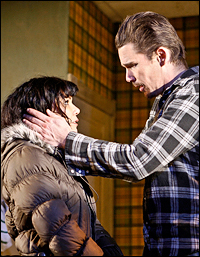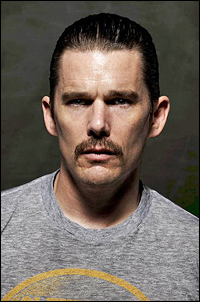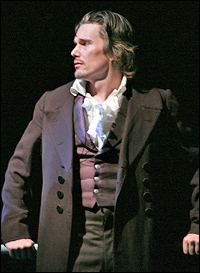
*
If you're a sucker for Christmas plays, best skip Blood From a Stone, which director Scott Elliott installed Jan. 6 for The New Group at Theatre Row on West 42nd.
Tommy Nohilly, the actor and first-time playwright, isn't kidding about the blood. Quite a bit is sloshed about during the three days of rain that hammer away at a Connecticut clan that comes completely unglued during a particularly chaotic Christmas. Even the cheapjack kitchen ceiling gives way from the driving downpour.
Ethan Hawke stars as a slacker/prodigal who chucks his job and comes home for the holidays before striking out for parts unknown. The Grade-A ensemble consists of Gordon Clapp and Ann Dowd as his parents, Natasha Lyonne and Thomas Guiry as his siblings and Daphne Rubin-Vega as the tarty (and married) girl next door.
Still wired from the histrionic workout he'd just been through, Hawke arrived for his Brief Encounter interview at the West Bank Café across the street from the theatre a tad tardy — but with a good excuse: Jack O'Brien had dropped by backstage, and "every time I have his attention I need to grab it and suck every piece of knowledge he has." He's the director who got Hawke in the Tony running for The Coast of Utopia. You can't top that, so you applaud his priorities and get on with the task at hand. You're sorta the star here, passing as a member of the ensemble, aren't you? I'm sure that must agree with you.
Ethan Hawke: Well, you know, it's a strange play in that my character,- Travis, is in every scene- — yet there's not one scene that is Travis' scene. That's one of the things interesting things about the play. It has a main character who's struggling t-o find a voice for himself because he is constantly the Zelig of the group — a different person with each of these characters. That's part of the fun of playing this character, but it's why the ensemble is so important in that all I'm doing is relating to them.
Was the ensemble angle the reason you were attracted to this project?
EH: The attraction for me really was I had a slew of revivals and, for a while now, I've been trying to find a new play because it's so much more difficult to originate a role. Once the map has been set, you can reinterpret it, but reinterpreting it is always different than discovering. It's not that big a deal to sail from London to New York now. The first time was the big deal.
And there's something about this guy that's worth fighting for. He's a voice, and part of an actor's job is to help playwrights find their voice.
I have to say, that first scene with you and your mother going through all that explosive exposition about the family's recent history — it was like you were bowling strikes. Boom boom boom. It really lifted the play off, and you were gone…
EH: When I read that first scene, I felt like I was reading the lyrics of a Bruce Springsteen song. I was, like, wow! And that's what made me fall in love with it.
 |
||
| Daphne Rubin-Vega and Ethan Hawke in Blood From a Stone |
||
| photo by Monique Carboni |
EH: Like Mamet and like Shepard. He writes for actors. You can tell, the way he writes speeches. He writes really challenging speeches. Natasha Lyonne comes on, does her speeches, and then she's gone. Only an actor would write a scene like that. If we do this play right, those scenes will be done in class in the next 25 years. All of these scenes are the kind of thing I can imagine working on in acting class.
I love your scene at the top of the second act with your father. It's the first time I really see your character trying to reach his father…
EH: ….and it just doesn't work, I know. When I got to that scene, that's when I decided to do the play. What's beautiful about it is it's two characters who both want to reconcile. They're both trying to reconcile. That's what they're thinking in their heads. He thinks if he gets the ice cream his son's going love him, and the son thinks, "Aw, I'll put up with this, but I'm reaching out. Please. I love you. Hear me." But he can't. They can't hear each other because each of them want it on their own terms. That's one of the weird moments where the play gets a little wise.
Have you ever worked with these actors before?
EH: Do you know what's funny about that? This is the first play that I have done without Josh Hamilton. I directed him in A Lie of the Mind and Things We Want, and we acted together in the two Bridge Project plays and Hurlyburly and all three of the Coast of Utopia plays. That's seven plays in a row — and we did the film "Alive." He's a great friend, and it just happened to work out that way, but this is the first time I've been without people I've ever worked with before.
I ask because not only is there chemistry on stage between actors, you all seem like a family as well.
EH: Scott Elliott is just good at casting. When Scott is at his best, he really excels in casting. I think this kid, Tom Guiry, is a real find. I had no idea who he was, and he's just wonderful. Scott's just great at figuring out who will go well together.
In rehearsing this, how did you get that family feeling going? I kept thinking, "That's a real family there. I understand that." It just really communicated to me. How do you, as actors, rehearse that?
EH: I dunno. That's just luck of the draw. I remember the first day I met Julie Delpy [his romantic co-star in 1995's "Before Sunrise" and 2004's "Before Sunset"], I couldn't stand her, but the first day I acted with her, I thought, "I'm going to know this woman my whole life." Sometimes you can play well with others, sometimes you can't — and it's not entirely up to you. It's a real challenge when you’re putting together a team of people who have to play together. Gordon Clapp is a great actor, but a lot of this production depends on whether or not you can work well together. I love working with that guy. I don’t know what makes for chemistry on stage.
 |
||
| Ethan Hawke |
||
| photo by Serge Nivelle |
EH: Of course, I'm glad I had that experience. In many ways, what we have going with The New Group now is some kind of rebirth of that community. One of the plays I directed for The New Group, in fact, was Jonathan [Marc Sherman]'s play, Things We Want. Josh and Jonathan were founding members of the Malaparte Theatre Company, along with me and Robert Sean Leonard. You and Robert were part of the "Dead Poets Society," Class of 1989. Do you have any plans, or hopes, of working together again?
EH: His show [TV's "House"] is about to end, and I said, "Let's get you at The New Group. What do you want to do when the TV thing is over?" So, hopefully, we'll get him. When we did "Dead Poet Society," he was the greatest actor I'd ever met, and he still is. I love that guy. I'd love nothing more than to direct him in a Tom Stoppard play where he could blow everybody away. I know what he is capable of. Did you ever see him in The Invention of Love? That guy deserved the Tony for that. I know he got it, but he deserved it.
Would you ever want to be an artistic director again, or have you cashed in your chips?
EH: To be totally fair, I would. This is not reality. I've now had two drinks, and I'm happy, but, if I can hand-paint my life, it would end with my running the first National Theatre of the United States of America. I'd take over for Jack O'Brien, after he started it. He's the guy who’s really capable of doing that.
I even loved the curtain calls for The Coast of Utopia. It was like rolling waves of the sea reaching the shore.
EH: It was like a poem. I have a journal entry about watching Jack sculpt the curtain calls of The Coast of Utopia. That man knows about stage, how the eye works and how it doesn't work — he's brilliant.
 |
||
| Hawke in The Coast of Utopia |
||
| photo by Paul Kolnik |
EH: I dunno. The thing that I think is important for America to have — whether it's O'Neill, Shepard, Tennessee or a new play — is the proper umbrella. We need for our country to do what the Moscow Arts Center does for Russia and what the National does in London. I don't know how to achieve it because this country doesn't care that much about the arts — or it feels that, somehow, somebody else should take care of it.
You're one of the few people I know who actually has an award for your theatre commitment [the Michael Mendelson Award for Outstanding Commitment to the Theatre in 2008]. You've earned it, too. You have a wonderful film career, but you keep coming to the stage all the time.
EH: It's a big surprise to me that theatre is my first love. I didn't know that when I was young. I loved theatre, but, as technology explodes more and more, I'm learning to love it even more. There's a beautiful Milan Kundera quote in his new book where he talks about the birth of a new art form called cinema. It was completely usurped by big business. Basically, now, it's big business. It's not cinema as art. What qualifies as an art picture is not what qualifies as literary fiction — and what a shame that is.
As people start watching "The Godfather" on an iPhone on the subway, the theatre becomes more and more relevant, and you realize that this ancient art form is going to survive all of this. It's funny, with rock music, music is cheaper and cheaper…but a live Bruce Springsteen concert is still priceless. A great work of theatre is priceless. It can't be repeated.
There's a great Meryl Streep quote I heard recently. When she was younger and really into theatre, they were saying, "Movies are immortal." Now that she's older, she realizes, "God, all the movies are dated." The only thing that's immortal is her production of The Cherry Orchard 33 years ago. The people who saw it love it and remember it. That hasn't dated, whereas even "Silkwood" is dated. Theatre lives. When I meet somebody who says to me, "I saw you in Jack's Henry IV," the first thing that comes to my mind is "What night?" They say, "Oh, Christmas," and I say, "Was my voice hurting?" "Yeah, your voice was really ragged." "I know. I was having such trouble." It hasn't aged a day. That's the beauty of theatre. You can't buy it on your iPod. You can't download it on iTunes. That makes it more special now.











